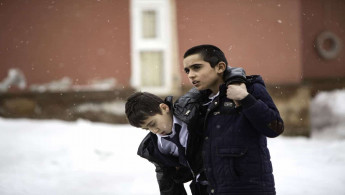Brother's Keeper: Fear, death and loathing at a Turkish boarding school
Selected for this year's Berlin Film Festival, Ferit Karahan's second feature film Brother's Keeper follows Yusef and Memo at a boarding school for Kurdish boys in the snowbound mountains of Eastern Anatolia, which one student identifies as "the Kurdish region" before his teacher responds, "There is no Kurdish region!"
This scene of repressed identity and its geography appears to undergird the movie's tensions. In Turkish-language class, we learn that some students had enrolled in school not knowing a word of Turkish, which they are expected to speak all the time.
Teachers slyly refer to a Kurdish poor work ethic, while discussing the janitors' inability to get the heat working – in front of their own students. The teachers fear being stuck in snow halfway down the mountain lest they "have to deal with them" – the Kurdish villagers.
In the boarding school, overworked Turkish teachers subject Kurdish students to humiliation, violence, and apathy. The students are told they're lucky to have the opportunity to study, but their most steady curriculum is punitive, whether a transgression has been exercised or not.
Reprimanded, slapped, demeaned, given cold showers when hot water is available, made to go hungry when the cafeteria is filled with food, the students have embarked on a course of study of deprivation and neglect.
 |
Reprimanded, slapped, demeaned, given cold showers when hot water is available, made to go hungry when the cafeteria is filled with food, the students have embarked on a course of study of deprivation and neglect |  |
The opening scene follows little boys –vulnerable, loud, skinny, argumentative – lining up for the showers. A teacher's punishment – the first of many in the draconian boarding school– for an argumentative group of boys initiates the plot: no hot water for the boys, a cold shower instead.
The boys accept their punishment silently as they have been trained to, even though their dormitory appears to be freezing without heat in sub-zero weather.
After their weekly shower, 11-year-old Memo falls ill. His friend Yusuf tries to advocate on Memo's behalf, but the distracted teachers neglect the boy until he becomes completely unconscious.
Having attended boarding school as a child, the director Karahan poignantly reveals in an interview that the sheer amount of violence in his school made the biggest impression upon him.
But watching the film, the most striking aspect of the neglect and deprivation is the disciplinary procedure that burdens every mundane, routine, quotidian aspect of student's lives.
The mechanics of schooling – the hierarchy, impersonality, disciplinarity – hamper the students as they try to get from point A to point B.
As Yusef tries to get his teachers to help, he is told to get Memo to the "sickroom", but rather than being occupied by a doctor or nurse, it's presided over by an older student who can only hand out aspirin.
When Memo doesn't eat or speak, Yusef's pleas for help from his teachers are thwarted by their attempts to discipline other students.
Even a teacher's attempt to inform the principal is thwarted by the principal's demand he punish another student. Yusef is then asked to stay by his friend's side until the van driver arrives. To do that, he has to get permission from another authority figure, who keeps him waiting while he delves into a racist diatribe about Kurds, then refuses to grant him permission because he's not on duty, and finally relents because there is no one else to give or refuse permission.
 |
But the slow, grinding pace at which they arrive at this seemingly intuitive moment – saving a child's life – is ultimately frustrating |  |
Meanwhile, the car set to drive Memo and Yusef to the hospital doesn't budge in the snow and the signal for the phones refuses to yield.
The recalcitrance of the environment is a mere reflection of the school system's tendency to weigh down the students with a lethargic, unresponsive, ineffectual order.
While Karahan's palpable condemnation of this cruel and ineffectual school system is clear, his treatment of the characters upholding this pathological order is not so clear-cut.
Some of the teachers and the principal do eventually display a sense of responsibility for Memo, even though it seems too little, too late. Eventually, they do try to get an ambulance sent from the hospital.
But the slow, grinding pace at which they arrive at this seemingly intuitive moment – saving a child's life – is ultimately frustrating.
The child-eye's view of the camera work through corridors of the school and crowds and queues of children deftly pulls us in its labyrinthine bureaucratic order – rank, hierarchy, impersonality, procedure, regulation – so we, too, are left breathlessly frustrated.
If modern schooling as a whole has been conceived by scholars as a disciplinary regime, what Foucault called a corrective, constraining "moral orthopedics", Karahan's vision of the boarding school for Kurdish children then represents Foucault's school-as-prison par excellence, displaying the everyday mechanics of schooling as a disciplinary technology: teaching subjugation and coercion as easily as Turkish grammar and geography.



